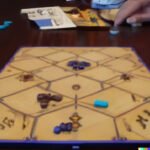Introduction
Board games are beneficial for young children ages 3-5 for a variety of reasons. They provide a great way to engage with your children, spend quality time together, and help them learn about rules, counting, sequencing, negotiation, and problem solving. Investing in board games for this age group also helps to enhance intergenerational play between younger and older family members as well as increase their linguistic skills through talking and listening while they play together. Furthermore, they can even help increase their attention span when playing longer games.
Benefits aside from the educational opportunities that accompany the playing of board games include improving social connections with peers and family members. Board games create a fun activity that encourages cooperation between multiple players through a shared goal of winning or achieving something within the game. They provide an atmosphere of competition without conflict because opponents can gain understanding when both parties are interested in the same outcome or learning similar strategies or techniques to win. In addition, it gives kids an opportunity to practice having patience by taking turns or preparing themselves for the next move during gameplay. Parental involvement is also encouraged during these activities which strengthens family bonds and reinforces important values such as communication and respect for each other and others around them.
Developmental & Cognitive Benefits of Board Games for Ages 3-5
Board games provide an excellent opportunity for children ages 3-5 to learn important lessons, enhance their development and promote cognitive growth. Playing board games has many benefits, including helping children improve their social skills, build problem solving skills, and increase creativity.
Playing board games provides a great way for children to interact with one another in a positive way, allowing them to practice healthy communication skills. Young children benefit from games that encourage cooperative play as this helps them better understand the concept of playing together nicely and taking turns. Board games provide an easy way for young kids to hone their language and communication skills. Games can also help introduce new vocabulary or words as well as reinforce existing word knowledge.
Different types of board games are designed to help teach basic math principles like sorting items by color or counting spaces when moving around the game board. As children take turns rolling the dice or spinning a spinner they learn the concept of number sequencing which can lead to understanding addition & subtraction. Games that contain elements such as pattern recognition help facilitate visual-spatial reasoning which is essential for later academic learning in areas such as mathematics & science.
The fun & competitiveness of some strategy based board games foster critical thinking & problem solving ability in young players essentially teaching them how to assess situations & plan ahead accordingly In addition these types of competitive activities also give children experience coping with both winning & losing while giving them opportunities to become more comfortable with taking risks without being scared of failure
Overall regardless of whether it is a cooperative or competitive game playing board games provides an excellent way for young children to develop valuable cognitive abilities while having fun at the same time!
Types of Board Games
Board games for ages 3-5 can be divided into two main categories: education/skill-based, and sensory/exploration-based.
Education/skill-based games are designed to help children develop critical thinking skills, memory, problem solving, and language development. Popular genres include counting, matching shapes and colors, sequencing activities and more. Brands such as Peaceable Kingdom, Hape, Raven’sburger and Blue Orange Games are recommended for age appropriate content that stimulates learning in a fun way.
Sensory/exploration board games provide an opportunity for hands on learning while discovering the wider world themes such as animals, cultures and transport. Genres offering these experiences are roll & move style games with tactile elements of magnets or finger paints; cooperative games where teamwork is necessary to achieve the goal; and creative story-telling activities. Orchard Toys, Hey!Play!, Thinkfun and Gigamic have award winning titles suitable for ages 3 – 5 which will keep little minds engaged while having lots of fun.
Tips for Choosing the Right Board Game for a Child’s Age
1. Research. Before buying a board game, research the appropriate age range for it. It is important to find a board game that is suitable and challenging enough for your child’s age.
2. Understand different types of games. Some games involve counting, while others require more advanced skills such as problem solving or strategic thinking. Consider what type of skills you want your child to be learning with the game you choose.
3. Look at reviews and customer feedback. Reviews can help you better understand how entertaining and educational the game may be for your child’s age group, as well as how it will perform in terms of quality and playability.
4. Address convenience needs. If you plan on taking the board game with you on vacation or to friends’ houses, consider the size and storage concerns when choosing a board game for the age group of 3-5 year olds. Look for options where pieces are either magnetic or easily sorted by color so they can quickly be set up instead of taking up room with long setup times that may bore younger children.
5. Evaluate its features & components . Tabletop pieces can include small parts that could present a choking hazard for some ages so examine them closely before making any purchase decisions, especially when working within this young age group from 3-5 years old . Additionally, consider accessibility features such as colorblind options or raised areas on the board to aid in tactile recognition when evaluating different board games available—just remember accessibility isn’t only just an issue of sight but also audio with consideration given to deaf audiences as well whenever possible!
Strategies for Introducing Board Games to Young Children
Board games are an excellent activity for young children as they help promote cognitive, problem-solving and critical-thinking skills. The best board games for ages 3-5 should be designed to be visually stimulating and engaging but not overly complex in the rules or play. When introducing board games to young children it is important to keep things simple yet fun. Here are some strategies for introducing board games to kids of this age:
1. Start with familiar themes: Young children often respond well to familiar characters such as those from a movie or TV show they already enjoy, so try choosing board games related to these characters or in similar genres like animals/nature and sports. This can help make the game more familiar and inviting while also teaching kids about the basics of game rules and turn taking.
2. Offer easy setup and short play time: Games that involve a lot of pieces may be too overwhelming for kids, so look for ones with fewer pieces and offering shorter play times (i.e., 15 minutes or less). This will help keep them engaged without feeling overwhelmed by the task or feeling like games take forever to complete.
3. Provide guidance on game rules: Take your time explaining the rules of the game and don’t rush through it! Kids need time to understand what a game requires from them before playing it effectively – let them ask questions throughout your explanation so that they fully understand what is expected from them once it’s their turn. Offering materials (such as colorful aids or instructions) can also make understanding the rules easier for young children.
4. Introduce simple modifications: Sometimes a board game becomes even more enjoyable when you modify existing rules! Try making up small changes such as reducing wait times between turns, allowing each player more than one action per turn, etc., These modifications create more flexibility in playtime which can make things easier (or more challenging!) depending on the level of difficulty desired.
5. Play together: Sitting down with your child is a great way to learn new games together! Playing alongside younger players who are just starting out helps empower them feel capable and encourages collaboration during gameplay – an invaluable skill that will last into adulthood!
Teaching Game Rules and Playing Techniques to Preschoolers
Playing board games is not only a lot of fun for children, but it’s also an incredible way to teach them important skills like counting and turn-taking. For young children, especially those between the ages of 3 and 5, there are a variety of excellent educational board games available. When purchasing games for preschoolers, look for those that focus on color matching, counting, even early language development. Preschoolers love vibrant colors that appeal to their eye, so choose a game with bright colors and themes that will interest your child.
When teaching game rules to young children it is best to keep things simple; explain the basic principles in terms they can understand. Reassure them they cannot do anything wrong and by playing lots of different board games they can learn new strategies. Introduce one-step games before two-step games – the goal should be to play without too much frustration or confusion. Allow your child to take his/her time as they come up with solutions; younger ones merely want reassurance that you are having fun with them.
Encourage preschoolers to treat each other fairly during gameplay as well as when playtime is over — making sure no player feels left out or excluded from subsequent plays. Once kids are familiar with a particular game or have gotten better at it, ask them questions such as “What piece do you think you’ll need next?” or “What number comes after three?” This will reinforce their understanding while allowing them to think strategically while playing the game in order find solutions on their own. Using board games as an educational tool can help your child develop essential skills while being highly entertaining at the same time!
Nurturing Good Sportsmanship Through Board Games
Board games for ages 3-5 can help foster a sense of good sportsmanship in children. These age-appropriate board games introduce children to the rules of social play and basic game concepts, while fostering healthy competition. Games that feature cooperative play allow young players to share in successes and enjoy a sense of accomplishment together, while simultaneously providing an opportunity to practice the concept of losing gracefully and accepting victory without gloating.
Board games are also a learning tool; they help to hone problem solving skills as well as hand-eye coordination. They provide an opportunity for children to practice their number recognition and counting capabilities in a fun way. For added fun, choose bright games with interesting characters or stories.
Through board games, parents can also use this time to teach the importance of communication and playing fair. Explain upon the start of each game what type of behavior is expected from all players – such as taking turns, following directions, losing with grace and winning politely. Allowing for discussion about what is happening during the game will further build upon those qualities that make up healthy sportsmanship – even at such an early age!
Conclusion
Board games for ages 3 to 5 offer children an entertaining and educational way to learn, develop important skills and have fun. Whether these board games are designed to teach children numbers, shapes, letters or simple strategy, young children will benefit from the time spent playing board games with friends or family. Board games are often designed to promote creative thinking, problem solving and teamwork skills. Parents and educators can use board games as an opportunity to engage a child’s natural curiosity about the world around them.
Not only do these types of board games provide important learning experiences for young children, but they also provide opportunities for families to spend quality time together in a fun atmosphere. During game play, parents are able to reinforce positive behaviors while teaching core concepts such as turn-taking and cooperation as players learn how different strategies can lead to success. Observing how a child approaches the game and interacts with other players provides insight into their cognitive development process and helps identify areas that may need further reinforce when it comes to learning new things.
Overall, letting your child explore age appropriate board games gives them an ideal way to grow intellectually and socially in an enjoyable setting as well as introducing essential life skills that will stay with them long after the last piece is put away. When selecting a game, always look carefully at its content and objectives in order to be sure that it is suitable for the age group it is intended for so you can ensure your child will ultimately enjoy their gaming experience.

I love playing all kinds of games – from classics like Monopoly to modern favourites like Ticket to Ride.
I created this blog as a way to share my love of board games with others, and provide information on the latest releases and news in the industry.





